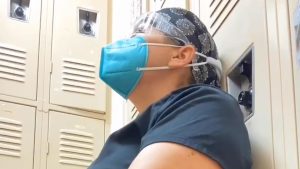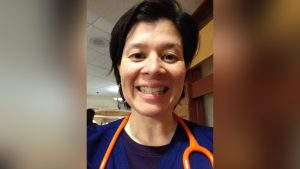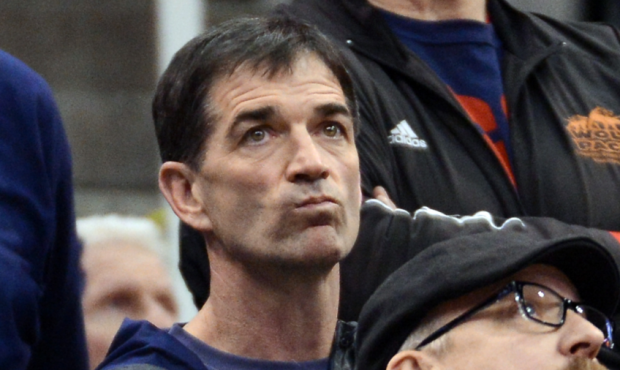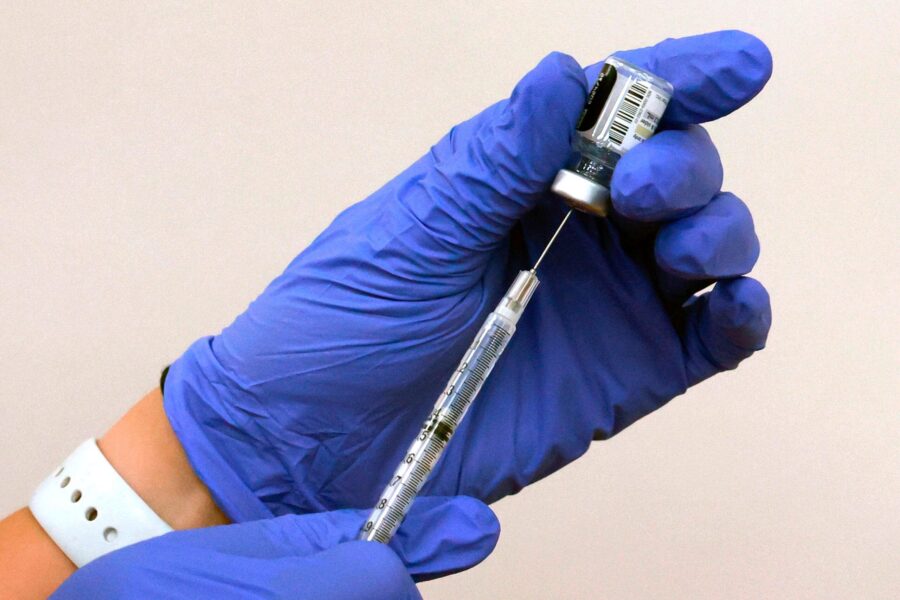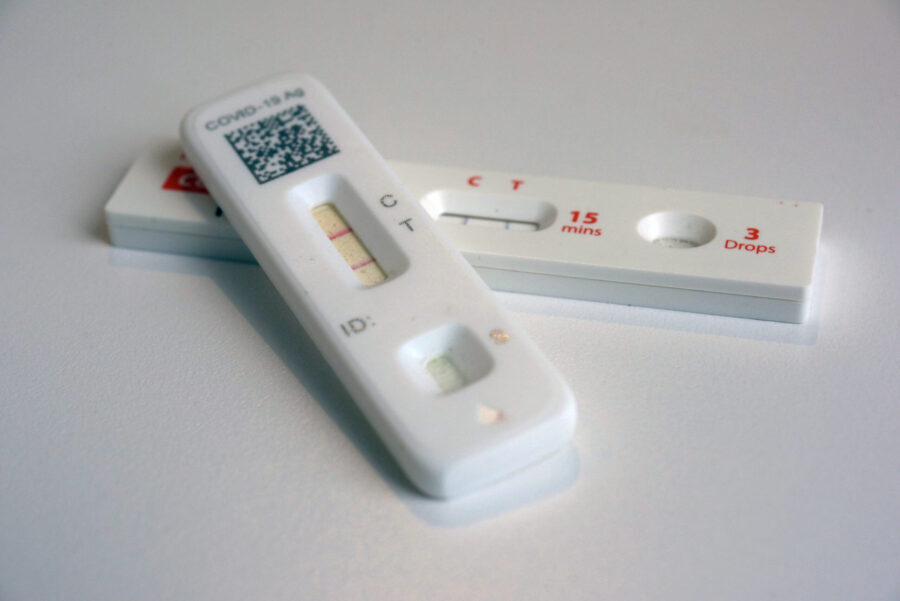Traumatized And Tired, Nurses Are Quitting Due To The Pandemic
Feb 25, 2021, 8:30 AM
Nursing was more than a career to Rachel Ellsworth. She says she was “called” to the work.
For 10 of her 12 years in nursing, Ellsworth was an indefatigable intensive care nurse. The work energized her, and she felt privileged to witness some of the most important moments of people’s lives, when their worlds shifted for better or worse. Though she did all she could to save them, she also found purpose in giving her patients a “peaceful, dignified death” when it was time.
“I was the kind of person who went into work every day, like, literally, ‘Let’s go save lives,’ for 12 years” she said. “I was just so excited to be there, so full of hope and compassion.”
When the pandemic began in spring 2020, her commitment was tested but not quashed. She and her colleagues talked about renting apartments and living apart from their families to serve their patients. Residents of their southeast Florida community threw parades for them to thank them for their work. Ellsworth felt supported, like the sacrifices she’d made were worth it.
Summer was worse. The hospital where she worked saw a major spike in Covid-19 patients. Some of those previous unknowns about the virus now had answers, many of them grim. It became disturbingly clear when a patient wouldn’t survive.
“We were very limited in what we could do to help them,” she said. “We were losing.”
The stress came to a head in late 2020 when a Covid-19 patient she “just adored, the sweetest guy,” begged her to try any treatments that could save him. But they’d tried everything. She had no hope to give him. There was no dignifying his death.
After months of debating the decision, she finally quit her job in January.
“It broke me,” she said. “It was just too much.”
Almost a year into the Covid-19 pandemic, America’s nurses — who for almost 20 years have been voted the country’s most trusted professionals — are running on empty. They’ve reused PPE, canceled PTO and worked extended shifts for employers they don’t always feel value their safety.
The stress and lack of support has driven many nurses to quit their jobs. And during the worst health crisis the US has seen in more than a century, the health care system can’t afford to lose them.
CNN spoke to three nurses from Florida, Oklahoma and Minnesota about why they quit their hospital jobs. It wasn’t a decision any of them made lightly — they’ve been nurses their entire adult lives.
And all three said they’re still overcome with guilt about leaving their jobs during the pandemic — even if they knew their decision was the right one.
“The mental-health impact this is going to have on nurses … I don’t think we’ve even scratched the surface of it yet,” Ellsworth said.
The pandemic has made existing problems worse, nurses say
The nurses who spoke to CNN quit for different reasons: Unsupportive workplaces, overwhelming stress, the fear of bringing Covid-19 home to their families.
But it wasn’t unusual for US nurses to consider quitting even before the pandemic.
“Covid has exacerbated all the problems that we know exist in a for-profit health care system,” said Jean Ross, president of the National Nurses United, one of the country’s largest nurses unions.
Before Covid-19, Ross said, nurses were increasingly told to “do more with less” — cover more hospital beds, handle more patients and work longer hours. Employers pointed to the nationwide nursing shortage. Even though there were more than 3 million nurses in the US workforce in 2019, the field isn’t growing at the same pace as the aging population that needs their care, according to the American Association of Colleges of Nursing.
Burnout was the primary factor driving nurses to quit before the pandemic, according to a study published this month in the journal Health Policy. Of the more than 418,000 registered nurses who quit their jobs in 2017, more than 30% of them said they left because of burnout, citing stressful work environments and inadequate staffing.
Many nurses feel they can’t provide the best care when they’re stretched so thin, Ross said.
Such was the case for Megan Chao Smith, a nurse in Minneapolis who before the pandemic worked on an end-stage heart failure floor. Nurses there helped their patients eat, breathe and use the restroom, among other basic functions. When her hospital cut staff, her workload doubled, and she said she often had to be in two rooms at once to keep her patients alive.
“If we were split in half it still would’ve been too much work,” she told CNN.
Working on that floor drained her. She couldn’t sleep or exercise or be present with her wife and child when her workday ended. She loved her job, but she couldn’t leave it at the hospital.
She felt she wasn’t “tough enough” to hack the increasingly unmanageable workload expected of her.
A majority of nurses may feel the same. An American Nurses Association survey, conducted in December 2020, found that close to 75% of nurses reported feeling exhausted in the last two weeks — not unexpected in a profession that keeps you on your feet for half a day.
Another survey, from the American Nurses Association’s Healthy Nurse, Healthy Nation project, found that at least 69% of US nurses said they agree or strongly agree that they put their patients’ health and safety before their own. That selflessness is not sustainable, said Stephanie Zerwas, an associate professor at the University of North Carolina, Chapel Hill, who established a free therapy program for health care workers during the pandemic.
“I think a lot of nurses got into nursing to serve,” Zerwas told CNN. “Their soul is really connected to being service-driven and wanting to provide for their community. But then they’re being pulled in several different directions.”
Nursing during normal times was demanding enough. Then came Covid-19. Nurses and physicians had to learn on the fly about treatment and protection. Zerwas compared it to “trying to build the airplane mid-freefall.”
It’s taken a mental toll. The December survey found that just 35% of nurses said they felt like their work had meaning, and only one quarter of all respondents said they were optimistic about the future.
Many nurses have been working nonstop since the pandemic began almost one year ago. And although there’s more hope now as health care workers and their older, at-risk patients get vaccinated, most nurses still feel worn down, Zerwas said.
“It’s this unrelenting grind,” she said. “It’s hard to be in the middle of that. The hallmark of pain is just that you feel like it’s never going to end.”
That grind could drive even more nurses to quit, worsening the nationwide nursing shortage — and worsening the burden on the nurses who remain.
Some nurses feel unsupported by their workplaces
In the pandemic’s early days, Denise Keeley, a military veteran and nurse of 40 years, was practically begging the managers at her Oklahoma City hospital for answers about how to protect herself and how Covid would affect her work. She says the answers never came.
Keeley is 64 and has a heart condition. She had a stent installed less than a year before the pandemic began and asked her manager to keep her off of Covid units. She said she filed a “reasonable accommodations” request to avoid working with Covid patients that was never approved.
Conditions were dire for nurses at her hospital, she said. Keeley claims she was never tested for Covid-19 on the job — it was only required for nurses who worked on Covid-dedicated floors. She said she was told to make her mask “last as long as it could.” She said she wasn’t allowed to wear an N95 respirator, the most effective mask in preventing Covid-19 transmission, because those were reserved for physicians.
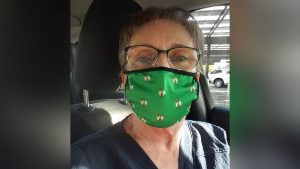
Denise Keeley, who’s been a nurse for more than 40 years, quit her job after her requests to be kept away from Covid-19 patients were unanswered. (Denise Keeley)
“It was just frustrating,” she told CNN. “The consideration for the staff just wasn’t there.”
She watched other nurses “jump ship” or find less demanding nursing jobs while she tried to convince herself things would improve. But she noticed that the lack of support from hospital management was taking a toll on her quality of care.
“All you want to do is take care of the patients, and then some patients would be like, ‘Is everything OK?'” she said. “That’s the worst thing a nurse wants to hear, that you think something is wrong with me, ’cause I want to take care of you.”
One night in the summer, while she sat in her car waiting for her night shift to begin, she had an inkling that her fears about her unit accepting Covid-19 patients had come true. She called a nurse on the floor, and sure enough, there were six patients who had tested positive for the virus.
She turned in her resignation that night.
Chao Smith, who moved from the heart failure floor to an observation unit, was rattled, too, when her unit at a Minneapolis hospital suddenly started accepting Covid-19 patients. Staff told nurses at Chao Smith’s hospital many of the same things Keeley heard: Nurses shouldn’t wear masks because it could “scare people,” and if they did have masks, they’d reuse them until the fell apart, she said.
“It wasn’t a feeling that anybody had our back,” she said.
Chao Smith was losing faith in the people leading her and in the institutions setting the rules while Covid-19 guidelines kept changing. She could no longer risk potentially exposing her wife and 10-year-old son to Covid-19.
She finally quit in April.
“Really, you cannot be forced to choose (between) your life and your job without people having your back,” she said. “I can’t as an adult allow that with the kind of heart and soul I’m putting into the service that I provide.”
Keeley and Chao Smith said their workplaces didn’t do enough to keep them safe. The nurses association survey from December found many other nurses feel the same — about 27% of respondents said they disagreed with the statement that their employers valued their physical health and safety. Even more nurses — around 31% — disagreed with the statement that their employers cared about their mental health.
Nursing is isolating work
Zerwas dislikes the description of nurses as “superheroes,” even if the lifesaving work they’re doing can seem like a feat of heroic resolve. Nurses, Zerwas said, are human, with foibles and feelings that can impact their work. As hard as they try, they can’t turn off their humanity to get through their workday.
And like the rest of us who don’t work in medicine, nurses need the support of their communities and workplaces to keep going, she said.
In the beginning of the pandemic, Zerwas said many nurses found motivation in the nationwide shows of support and gratitude for frontline workers — the nightly rounds of applause across cities, car parades, casseroles and thank-you cards.
Those gestures have largely stopped as pandemic fatigue set in, she said.
Zerwas said she’s heard from nurses who steer clear of social media, where they might’ve found a community of other nurses to vent to, because their friends will share photos of themselves maskless, socializing indoors or in a large group.
“It’s emotional whiplash,” she said.
Coming into close contact with the sick has forced many nurses to live apart from their families and loosen the social ties that had buoyed them before, Zerwas said. Those coffee chats, post-work drinks and other gatherings — all gone now — have never meant so much.
The nurses who quit still feel guilty
All three nurses told CNN they shouldered immense guilt for quitting, even months later. It’s hard for them to shake the feeling that they broke a cardinal rule of their profession by putting themselves before their patients.
“Sometimes you think, ‘Oh, I left them there,'” Keeley said. “Hopefully, someone is stepping up.”
Keeley hadn’t planned to retire from nursing for another three years before she left in August. Now, she works part-time at Kohl’s, providing a “different kind of customer service.” She also volunteers at vaccination sites through the Oklahoma Medical Reserve Corps so she can continue nursing duties in some form.
She said she’d probably return to the job if they fixed some of the issues that made her leave.
“There’s probably too much water under the bridge now, though,” she said.
Chao Smith took a new job at a hospice center where patient capacity is capped and the goal, she said, is to “love the patients and be there and not have to run out or go do something else.”
The work is still emotionally and physically draining, she said, but it’s more sustainable. She’s able to work every other week, so she can take over homeschooling duties when she’s home.
Ellsworth feels weak and inadequate for leaving the job she loved. The nurses who stayed, she said, are her heroes.
“These nurses — they are stronger than me,” she said. “They’re doing it and I walked away.”
After quitting, Ellsworth moved her family to Kentucky, where she’s trying her hand at homesteading (a process she’s documenting on TikTok for her nearly 40,000 followers). She was inspired to move after vacationing on a friend’s farm, where her mind finally stopped racing.
Though her pace of life has slowed and she feels closer to her children, she’s already started to look for jobs back in intensive care and hospice so she can resume providing “dignity in death.”
She’s not certain she’s recovered enough to jump back into the work, though.
“I really want to give myself the opportunity to heal,” she said. “That feels dramatic, but it’s true.”
For now, Ellsworth will keep coping on TikTok, lip syncing to videos about the trauma she faced as a nurse. They are as heartbreaking as they are humorous. She’ll go back to the work she loves only when — and if — she’s ready.

